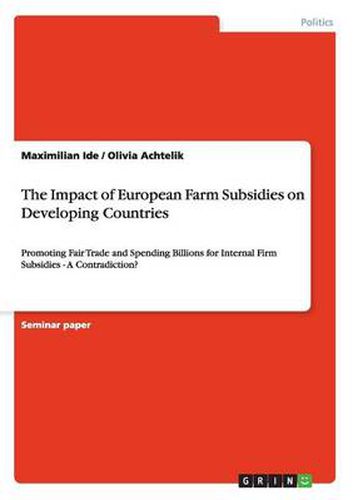Readings Newsletter
Become a Readings Member to make your shopping experience even easier.
Sign in or sign up for free!
You’re not far away from qualifying for FREE standard shipping within Australia
You’ve qualified for FREE standard shipping within Australia
The cart is loading…






Seminar paper from the year 2011 in the subject Politics - International Politics - Topic: Development Politics, grade: A+ (1,0), Sookmyung Women’s University, course: Fair Trade and Social Enterprises, language: English, abstract: The importance of Fair Trade products for the world economy has been significantly growing within the last decade. In 2010, the global Fair Trade turnover reached 3.4 billion showing an upward trend with double-digit growing rates per year. One of the biggest selling markets for certified Fair Trade products is the European Union (EU) which is thus a crucial actor when it comes to promote and market Fair Trade goods (see attached table 1). Yet, besides the EU’s effort of achieving a fairer international trading system, it can be argued that the EU might be even partially responsible for the misery in those countries. In this context the Common Agricultural Policy (CAP) of the EU is controversially discussed. About 60 billion which account for 42% of the total EU budget are currently spent on agricultural subsidies. They are provided to European farmers to support and protect the internal agricultural market. Consequences for other agrarian countries are immense. In our research paper we want to investigate the paradox on Europe spending money on Fair Trade on the one hand, while dishing out harming subsidies on the other hand. We question whether it would be more beneficial for developing countries if Europe stepwise reduces its agricultural subsidies to a minimum rather than investing in Fair Trade. First of all, a brief introduction to the Fair Trade principles and its history is provided. The main efforts of the EU to achieve a fairer trading system are identified in Chapter 3. Chapter 4 will briefly present the basic principles of the EU’s Common Agricultural Policy (CAP) including the payment of direct farm subsidies to European farmers. Chapter 5 will reveal how Europe’s agricultural subsidies influence the world market and w
$9.00 standard shipping within Australia
FREE standard shipping within Australia for orders over $100.00
Express & International shipping calculated at checkout
Seminar paper from the year 2011 in the subject Politics - International Politics - Topic: Development Politics, grade: A+ (1,0), Sookmyung Women’s University, course: Fair Trade and Social Enterprises, language: English, abstract: The importance of Fair Trade products for the world economy has been significantly growing within the last decade. In 2010, the global Fair Trade turnover reached 3.4 billion showing an upward trend with double-digit growing rates per year. One of the biggest selling markets for certified Fair Trade products is the European Union (EU) which is thus a crucial actor when it comes to promote and market Fair Trade goods (see attached table 1). Yet, besides the EU’s effort of achieving a fairer international trading system, it can be argued that the EU might be even partially responsible for the misery in those countries. In this context the Common Agricultural Policy (CAP) of the EU is controversially discussed. About 60 billion which account for 42% of the total EU budget are currently spent on agricultural subsidies. They are provided to European farmers to support and protect the internal agricultural market. Consequences for other agrarian countries are immense. In our research paper we want to investigate the paradox on Europe spending money on Fair Trade on the one hand, while dishing out harming subsidies on the other hand. We question whether it would be more beneficial for developing countries if Europe stepwise reduces its agricultural subsidies to a minimum rather than investing in Fair Trade. First of all, a brief introduction to the Fair Trade principles and its history is provided. The main efforts of the EU to achieve a fairer trading system are identified in Chapter 3. Chapter 4 will briefly present the basic principles of the EU’s Common Agricultural Policy (CAP) including the payment of direct farm subsidies to European farmers. Chapter 5 will reveal how Europe’s agricultural subsidies influence the world market and w